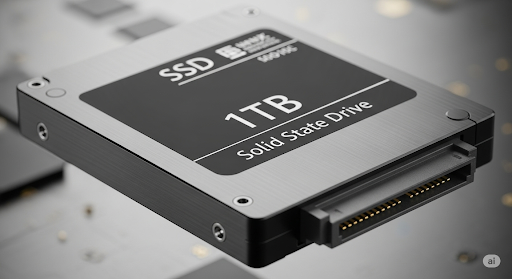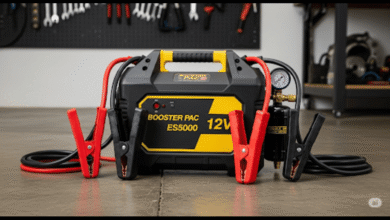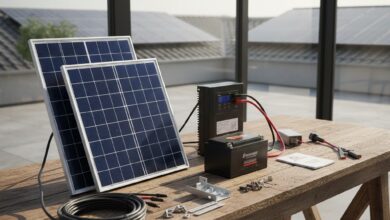1TB Solid State Drive: The Perfect Balance of Speed and Storage

In today’s world of large games, 4K videos, and ever-growing work files, having fast and reliable storage is no longer optional—it’s essential. That’s where the 1TB Solid State Drive (SSD) comes in. It offers the sweet spot between speed, capacity, and affordability, making it one of the most popular storage upgrades for laptops, desktops, and even gaming consoles.
Why Choose a 1TB SSD?
A 2TB SSD gives you enough space to store an extensive library of files—think hundreds of HD movies, thousands of high-resolution photos, or several AAA video games—while still benefiting from lightning-fast read and write speeds compared to traditional hard drives.
For example:
- Gamers enjoy shorter load times and smoother performance.
- Video editors can handle large raw footage without frustrating lag.
- Everyday users notice faster boot times and snappier file access.
Types of 1TB SSDs
When shopping for a 2TB , you’ll come across different formats and interfaces:
- SATA SSDs
- Shape: 2.5-inch form factor
- Speed: Up to ~550 MB/s
- Best for: Upgrading older laptops and desktops
- Pros: Affordable and widely compatible
- NVMe (M.2) SSDs
- Shape: Slim stick-like module
- Speed: 3,000–7,000 MB/s (or higher)
- Best for: Modern systems with M.2 slots
- Pros: Blazing fast, excellent for demanding tasks
- External 1TB SSDs
- Connect via USB-C or Thunderbolt
- Portable and great for backups or on-the-go editing
- Speeds vary depending on connection type
How Much Does a 1TB SSD Cost?

The price depends on brand, speed, and technology:
- SATA 1TB SSDs: $45–$70
- NVMe 1TB SSDs: $60–$120 for mainstream, $150+ for top-tier
- External 1TB SSDs: $80–$200 depending on speed and durability
Over the past few years, SSD prices have dropped significantly, making 1TB drives far more accessible than before.
Performance Benefits
Switching from an HDD to an SSD—even at the same capacity—can be a game-changer:
- Boot times: From 30–60 seconds to under 10 seconds
- File transfers: Gigabytes moved in seconds, not minutes
- Game loads: Levels load faster, meaning less waiting and more playing
- Durability: SSDs have no moving parts, so they resist shock and vibration better than HDDs
Things to Consider Before Buying
- Compatibility
- Check if your device supports SATA, M.2 NVMe, or PCIe Gen 4 before purchasing.
- Speed Needs
- Everyday users may be fine with SATA.
- Professionals and gamers might benefit more from NVMe’s speed.
- Warranty and Endurance
- Look for drives with at least a 3–5 year warranty.
- Consider the TBW (Terabytes Written) rating for longevity.
- Brand Reputation
- Reliable names include Samsung, Crucial, WD, Kingston, and Sabrent.
Installing a 1TB SSD
- Laptop/PC upgrade: Clone your existing drive or do a fresh OS install.
- Gaming consoles (like PS5): Follow manufacturer guidelines and ensure the SSD meets speed specs.
- External use: Plug and play via USB or Thunderbolt.
Most upgrades take less than an hour, and the performance boost is immediate.
Future Outlook
As NAND flash technology improves and production scales, 1 T B SSDs will likely become the “new standard” base storage for most systems, with 2TB+ options becoming increasingly affordable.
FAQs: 1TB Solid State Drive
Q1: Is 1TB enough for gaming?
A: Yes, for most gamers. A 2TB SSD can store 8–15 large AAA titles plus plenty of indie games. However, modern games can be huge (100GB+), so heavy gamers might eventually need more.
Q2: Which is faster—SATA or NVMe 1TB SSD?
A: NVMe drives are much faster, often 5–10 times the speed of SATA SSDs, but both are far quicker than HDDs.
Q3: Can I use a 1TB SSD as an external drive?
A: Absolutely. External SSDs are perfect for backups, media libraries, or working on projects between devices.
Q4: How long will a 1TB SSD last?
A: With typical use, a quality 2TB SSD can last 5–10 years or more, thanks to wear-leveling technology and robust NAND flash.
Q5: Are all 1TB SSDs compatible with PS5 and Xbox Series X?
A: No. PS5 requires specific NVMe drives with high-speed specs, while Xbox Series X uses proprietary expansion cards. Always check the official compatibility list.
Q6: Should I buy the cheapest 1TB SSD?
A: Not necessarily. A very cheap SSD may use lower-quality NAND or have slower speeds. Balance price with brand reliability and warranty.
Q7: Will a 1TB SSD improve my laptop’s battery life?
A: Yes, in most cases. SSDs are more power-efficient than HDDs, so they can slightly extend battery runtime.
Final Thoughts
A 1TB Solid State Drive hits the sweet spot for performance and capacity. It’s big enough for large media libraries or gaming collections, fast enough for creative professionals, and affordable enough for everyday users. Whether you go for SATA, NVMe, or an external option, the upgrade will breathe new life into your device—making everything from booting up to launching apps feel instant.




